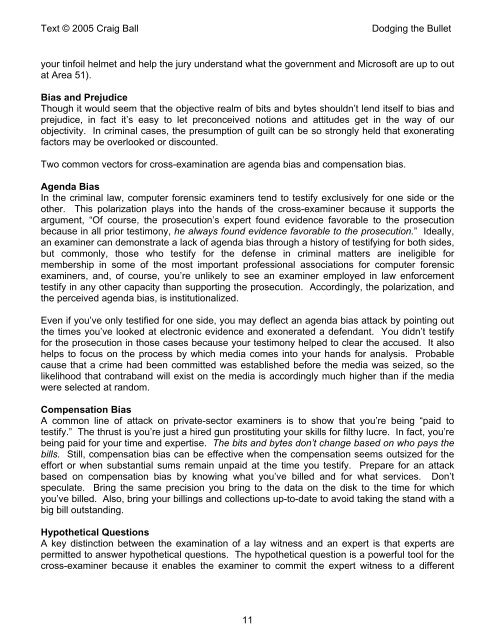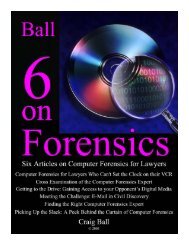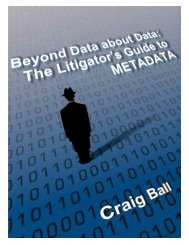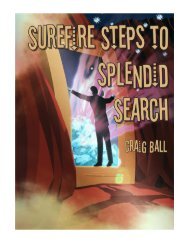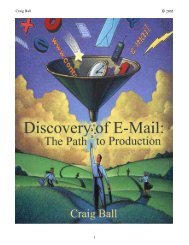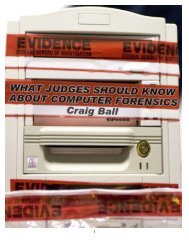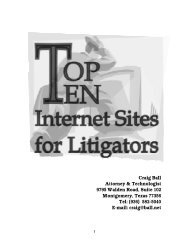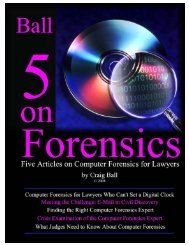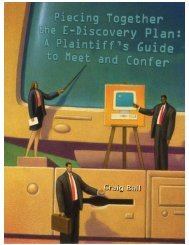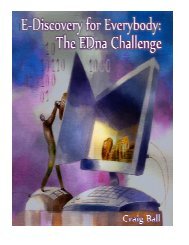The Ten Commandments of Cross-Examination for ... - Craig Ball
The Ten Commandments of Cross-Examination for ... - Craig Ball
The Ten Commandments of Cross-Examination for ... - Craig Ball
Create successful ePaper yourself
Turn your PDF publications into a flip-book with our unique Google optimized e-Paper software.
Text © 2005 <strong>Craig</strong> <strong>Ball</strong> Dodging the Bullet<br />
your tinfoil helmet and help the jury understand what the government and Micros<strong>of</strong>t are up to out<br />
at Area 51).<br />
Bias and Prejudice<br />
Though it would seem that the objective realm <strong>of</strong> bits and bytes shouldn’t lend itself to bias and<br />
prejudice, in fact it’s easy to let preconceived notions and attitudes get in the way <strong>of</strong> our<br />
objectivity. In criminal cases, the presumption <strong>of</strong> guilt can be so strongly held that exonerating<br />
factors may be overlooked or discounted.<br />
Two common vectors <strong>for</strong> cross-examination are agenda bias and compensation bias.<br />
Agenda Bias<br />
In the criminal law, computer <strong>for</strong>ensic examiners tend to testify exclusively <strong>for</strong> one side or the<br />
other. This polarization plays into the hands <strong>of</strong> the cross-examiner because it supports the<br />
argument, “Of course, the prosecution’s expert found evidence favorable to the prosecution<br />
because in all prior testimony, he always found evidence favorable to the prosecution.” Ideally,<br />
an examiner can demonstrate a lack <strong>of</strong> agenda bias through a history <strong>of</strong> testifying <strong>for</strong> both sides,<br />
but commonly, those who testify <strong>for</strong> the defense in criminal matters are ineligible <strong>for</strong><br />
membership in some <strong>of</strong> the most important pr<strong>of</strong>essional associations <strong>for</strong> computer <strong>for</strong>ensic<br />
examiners, and, <strong>of</strong> course, you’re unlikely to see an examiner employed in law en<strong>for</strong>cement<br />
testify in any other capacity than supporting the prosecution. Accordingly, the polarization, and<br />
the perceived agenda bias, is institutionalized.<br />
Even if you’ve only testified <strong>for</strong> one side, you may deflect an agenda bias attack by pointing out<br />
the times you’ve looked at electronic evidence and exonerated a defendant. You didn’t testify<br />
<strong>for</strong> the prosecution in those cases because your testimony helped to clear the accused. It also<br />
helps to focus on the process by which media comes into your hands <strong>for</strong> analysis. Probable<br />
cause that a crime had been committed was established be<strong>for</strong>e the media was seized, so the<br />
likelihood that contraband will exist on the media is accordingly much higher than if the media<br />
were selected at random.<br />
Compensation Bias<br />
A common line <strong>of</strong> attack on private-sector examiners is to show that you’re being “paid to<br />
testify.” <strong>The</strong> thrust is you’re just a hired gun prostituting your skills <strong>for</strong> filthy lucre. In fact, you’re<br />
being paid <strong>for</strong> your time and expertise. <strong>The</strong> bits and bytes don’t change based on who pays the<br />
bills. Still, compensation bias can be effective when the compensation seems outsized <strong>for</strong> the<br />
ef<strong>for</strong>t or when substantial sums remain unpaid at the time you testify. Prepare <strong>for</strong> an attack<br />
based on compensation bias by knowing what you’ve billed and <strong>for</strong> what services. Don’t<br />
speculate. Bring the same precision you bring to the data on the disk to the time <strong>for</strong> which<br />
you’ve billed. Also, bring your billings and collections up-to-date to avoid taking the stand with a<br />
big bill outstanding.<br />
Hypothetical Questions<br />
A key distinction between the examination <strong>of</strong> a lay witness and an expert is that experts are<br />
permitted to answer hypothetical questions. <strong>The</strong> hypothetical question is a powerful tool <strong>for</strong> the<br />
cross-examiner because it enables the examiner to commit the expert witness to a different<br />
11


